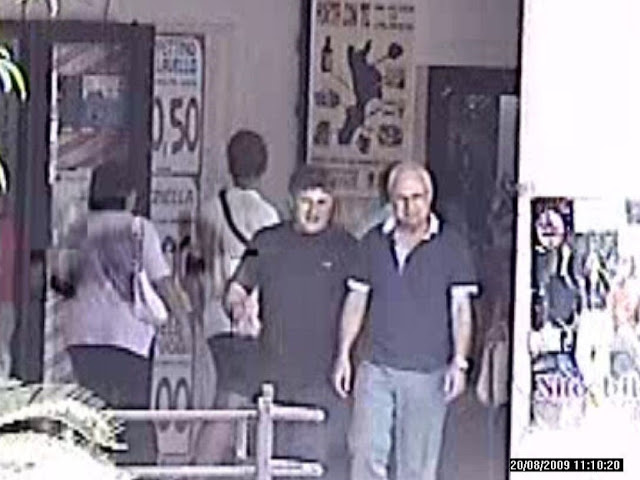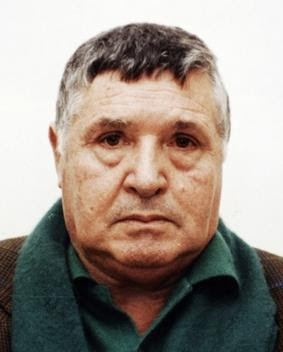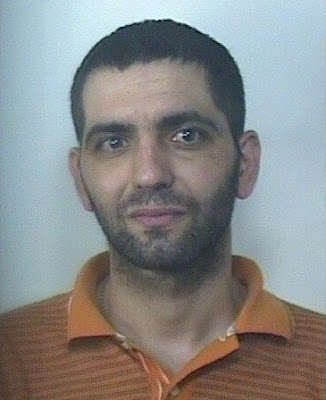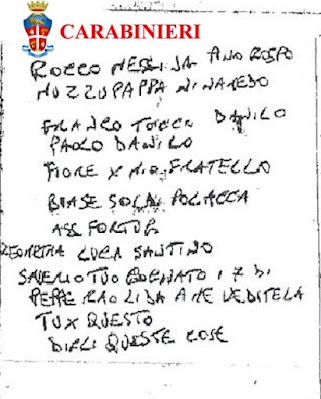'Ndrangheta Dynamics In The Greater Toronto Area: The Story Of An Internal Mafia Clash (Part 3.2)
By Andrew Machin
Before illustrating these relationships, two fundamental explanations are needed.
① The assertion: “Verduci was part of a group that became involved with Sal Montagna,” requires some clarification.
At that time, indeed, it is to be excluded that Verduci could act autonomously, but only as a representative of his Locale, subject to the consent of the top bosses above him.
 |
| Carmelo Bruzzese, right. |
During his stay in the GTA, Antonio was assisted by men who, like him, periodically visited Calabria for the purposes of their Clan.
They were:
❶ His father-in-law, Carmelo Bruzzese, on the right in the photo above taken by the police in Siderno, on Aug. 20, 2009, following wiretapping activities. The picture was interesting because it documented Bruzzese’s meeting with another ‘Ndrangheta member (later sentenced to 14 years in prison), including the non-random way of carrying it out: the two talked outdoors and walked along a busy street, which is a precise technique to hinder possible listening of conversations (about the integrated activities of police intelligence, and the relative counterintelligence by mobsters, see the precedent Part 3.1). Back in Canada, Carmelo Bruzzese (a formally permanent resident of Canada since 1974) was arrested in Vaughan, always just north of Toronto, by the RCMP and Canada Border Services Agency, in Aug. 2013. He was deported to Italy in Oct. 2015.
❷ Vincenzo Tavernese, who was a very close business partner of Antonio Coluccio, as widely documented by Italian Project Crimine.
❸ Carmine Verduci himself.
Therefore, such an important decision should have passed the scrutiny of Antonio Coluccio and the other influential figures close to him. And not just of them.
Indeed, Antonio
Coluccio, in turn, should almost certainly have received instructions from the
boss of his mother-Locale in Calabria. We are not referring to his older
brother Giuseppe, who was at the time under the strict prison regime in Italy (the
so-called “41-bis”) after being caught right in the GTA (Markham) on Aug. 8,
2008. But to Rocco Aquino (see Part 1),
related to the Coluccio brothers themselves and supreme boss of the
mother-Locale of Marina di Gioiosa Ionica until his arrest on Feb. 10, 2012 (so,
he was fully operational during the attack on the Rizzutos).
In
conclusion, the decision regarding the possible choice of taking the field
alongside Salvatore Montagna would never have been taken by Carmine Verduci
individually, but only by the supreme boss of the mother-Locale in Calabria, previously
consulted by the leading exponents of the Locale operating in the GTA (in Part 1, quoting Project Crimine, we ascertained
how high the authority attributed to Aquino, for instance, by Vincenzo
Tavernese, was; on that occasion, during a visit to Calabria, the latter invited
Aquino to go to Canada to resolve a conflict with presumably another member of
the ‘Ndrangheta in the GTA).
Furthermore, such a decision-making process would have been coherent with what is commonly heard in interceptions and statements by former members of the 'Ndrangheta who have become government witnesses in Italy. According to them, as a rule, all relevant decisions, especially if they have a strategic value, are taken in Calabria even when they concern issues in territories outside it.
Not surprisingly, the wait for approval from Calabria (without which there is no way to proceed) is a typical phase that distinguishes any matter or relevant affair involving the 'Ndrangheta outside its homeland.
② In any case, denying that the ‘Ndrangheta from Marina di Gioiosa Ionica had supported the attempted overthrow promoted by Salvatore Montagna does not mean that other criminal components of Calabrian origin in Ontario could not have joined the plans of the high-ranking member of the Bonanno Family from New York City instead.
In this regard, the reconstructions, in particular, in the best seller by P. Edwards and A. Nicaso: “Business Or Blood: Mafia Boss Vito Rizzuto's Last War” (Random House Canada, 2015), can be considered more than plausible. According to it, "Soon after his move to Canada [in 2009]", Salvatore Montagna appeared in front of organized crime figures of Calabrian origin rooted in Southern Ontario (without instead contacting the Sicilian mobsters who resided there, as he should have done according to the mafia protocol, being himself of Sicilian origins).
More precisely, he would have met individuals:
❶ From the GTA and belonging to the
‘Ndrangheta (a description and an update of its structure have been provided, respectively,
in the fourth and seventh articles of this series).
❷ From Hamilton and belonging to the
Calabrian component of the American Cosa Nostra Buffalo Family.
One or more of them could be motivated even by revenge alone; first of all, the Luppino-Violi blood families from Hamilton. Indeed, they certainly could not forget the assassination, on Jan. 22, 1978, of Paolo Violi, the top boss of the Calabrian mafia in Montreal, as well as of his two brothers, Francesco and Rocco, by the Sicilian Rizzutos (as is well known, mobsters' mentality does not conceive of setting a deadline for revenge).
For others, the aim could be to achieve, thanks to this alliance, that strategic goal represented by the opening of the Port of Montreal to the transit of drug shipments as the front door to enter the Canadian and US markets.
This last brilliant hypothesis formulated by the two aforementioned authors was undoubtedly well-founded.
'Ndrangheta members are generally great drug traffickers on an international scale. Therefore, they are well aware of the key role of ports along drug supply chains, especially cocaine from South and Central America (generally, the responsibility for loading a shipment of cocaine lies with the seller; unloading is the buyer's responsibility).
In this sense, sea transportation would have been a much more advantageous alternative to the land route from Mexico used until then to supply eastern North America.
Such a perspective could therefore be attractive for some Locali from the GTA. In particular, for those that did not have relations with the Montreal Family but perhaps had, or planned, with the Calabrian faction in Montreal deployed at the side of Salvatore Montagna.
o-o-o-o-o-o-o
After making these two clarifications, a number of judicial records and news items will now be reported to show that the top bosses of the Coluccio Clan (in chronological order: Carmelo Bruzzese and the brothers Antonio and Giuseppe Coluccio) had stable and significant relationships with the Rizzuto crime family. As will be explained in point ③ below, these close ties continued until Giuseppe Coluccio’s arrest in Aug. 2008. Therefore, only a few months before the frontal attack suffered by the Rizzutos.
① The first known relationships dated back to the early 2000s, and they were reported as part of an Italian Project code-named Orso Bruno, transl. Brown Bear (2007), which, among others, focused on the figure of Carmelo Bruzzese.
Specifically, the investigation in question concerned the attempted laundering of a huge amount of money by the Rizzuto crime family through the construction of the bridge across the Strait of Messina.
Having to stand on their territory, mobsters have always paid attention to this bridge project, which was (and is) gigantic by Italian standards.
Suffice it to say that, in this regard, already in 1990, during a meeting in Calabria with the supreme bosses of all three macro-areas of the ‘Ndrangheta in Reggio Calabria province (Ionian and Tyrrhenian Sides, Center-Reggio Calabria City), Salvatore Riina in person (below) had stated the rule underlying the agreement between the two organizations. It had been revealed, together with other topics covered on that occasion, by a government witness, Antonino Lo Giudice, a former high-ranking member (the rank of Padrino; transl. Godfather) in charge of a district of the city of Reggio Calabria.
[Note that the English term rank is used here for translation and comprehension purposes only. Indeed, the 'Ndrangheta categorically refuses to use any military term that can evoke law enforcement. For this reason, in the specific
case, it attributes this fundamental meaning, in Italian, to the not-military
word "dote"; transl. gift, privilege].
This information had come to him from an even more powerful boss, a leading exponent of the Locale of Archi (the Locale that dominated and dominates even today the city of Reggio Calabria). His position had allowed the latter to attend that meeting at the highest criminal level (in the first part of this article, we explained that the contents of a mafia meeting can be revealed live by police listening devices set up at the meeting place, but also by one or more government witnesses subsequently able to report news learned directly or de relato).
Based on these revelations, “Sicily” (Sicilian Cosa Nostra) and “Calabria” (‘Ndrangheta) would have shared 50% of the entire construction work. Thus, indirectly establishing equal dignity between the two organizations.
This last story is far from irrelevant. It tells us that, even in the moment of maximum criminal power by the Sicilian Cosa Nostra under the dictatorship of Salvatore Riina (1982-1992), the ‘Ndrangheta was recognized to have, without question, the same strength and weight.
All this despite many members of the 'Ndrangheta being aware that not even they could compete in criminal ferocity with the Corleonesi headed by Riina.
Another government witness, Antonino Fiume (always from the Locale of Archi), in the course of a trial in 2019, motivated this superiority by mentioning the special oath requested by the Corleonesi at the time of the official affiliation of new members with their Family. His words described a ritualization that, potentially sacrificing even the closest blood ties, reached levels inconceivable even for the ‘Ndrangheta members:
“Many [men affiliated with the ‘Ndrangheta] were afraid of the Corleonesi because the oath that is made in some clans… you swear loyalty to the group. But they [the Corleonesi], compared to others, had a particular oath that if, for example, one was affiliated by Riina and Riina asked him to kill his brother, he had to kill him”.
It is noteworthy that it was impossible to back down in a situation like the one quoted above. Any refusal by the candidate to swear would have meant for him not to leave the place of the ceremony alive.
 |
| Toto Riina. |
A part of the
quotation referring to Project Orso Bruno and concerning Carmelo Bruzzese has
already been presented throughout this explanation (see Part 1), as reported by Project Crimine.
However, below is the complete passage. In this way, it will be possible to note first the relationships between Bruzzese and Verduci, confirming their closeness; right after, Verduci’s role as a messenger of news and orders between the two Atlantic sides (see Part 2). The same function that, in the context of the present examination, he could then also have performed between different cities in Canada (as we learned in the first part of this article, the task of bringing or receiving news and orders on behalf of one or more top bosses who prefer to stay covered or cannot move is called, in Italian mafia jargon, ambasciata, pl. ambasciate; transl. embassy, embassies).
“… BRUZZESE Carmelo who is defined in the cited order of pre-trial detention [resulting from Project Orso Bruno] as the referent of the "Calabrian cell" of the organization, closely linked to the top of the organization, in contact with Vito RIZZUTO's most direct collaborators and with the same boss before his arrest, which took place in Jan. 2004, as well as with leading exponents of the Calabrian organized crime”.
(…)
“In the course of the investigations, in addition to documenting relationships functional to the existence of the partnership with ARCADI Francesco, who was listed by the Canadian police as the successor of Vito RIZZUTO (after his arrest - extradition to New York), it is possible to note, for the current proceedings, the relationships between BRUZZESE Carmelo and VERDUCI Carmine who, based on the conversations taped in that context, is defined “a figure who has already emerged in the investigations to be close to the well-known Carmelo BRUZZESE” and having the task of systematically traveling between Italy and Canada, acting as a news carrier between the Italian and Canadian groups, as moreover found in the current proceedings [Project Crimine].”
A direct
relation had been reported in a 2012 “Toronto Star” article:
“On Jan. 15, 2004, the wiretap transcripts show that Bruzzese was chatting with Rizzuto about personal family affairs and an upcoming transaction involving an unspecified exchange.
“I have it here in Toronto . . . is everything ready, if someone from there comes here,” Bruzzese tells Rizzuto just before Bruzzese is scheduled to come to Ontario.
“There is no problem,” Rizzuto assures him.
But there was a problem.
Rizzuto was arrested five days later in his home in Montreal as part of an FBI-led sweep of the Bonanno crime family that would eventually see him sentenced to 10 years in U.S. prison for his role in a murder”.
(J. Sher,
R. Cribband, P. Edwards, “Toronto Star”, Oct. 3, 2012).
In particular, as already illustrated in the first part of this article, during telephone conversations:
❶ They never pronounce the names of people; at best,
nicknames (this explains their wide use).
❷ They never talk about criminal affairs openly. To the limit, they can make some hints but only using a language so allusive and fragmentary, generally totally or partially in Italian dialect, to result incomprehensible to eventual external listeners.
However, wiretapping, combined with other tools, remains very useful for tracking the movements of the monitored people (in this case, Carmelo Bruzzese himself).
Instead, an indirect relationship can be found in the aforementioned
“Business Or Blood: Mafia Boss Vito Rizzuto's Last War”:
“Italian police listened in on Christmas Eve 2004, as Bruzzese took a call from Vito’s lieutenant, Compare Frank Arcadi, who was about to visit Vito in jail in Montreal shortly after his arrest. Bruzzese asked Rizzuto’s lieutenant to send the jailed Mafia leader “my best regards”, according to the wiretap transcripts”.
For the mobsters' mentality, bringing greetings to a jailed man, especially to a boss, has a precise meaning beyond common sense. By doing so, the bearer intends to inform a given person that he considers the relationships of availability, loyalty, and trust with him still intact even though the latter is imprisoned at that time and consequently in a situation of objective difficulty. As a result, it is a particularly appreciated type of message that will be remembered in the future by those who received it.
Thus, Bruzzese had exactly replicated this typical pattern of behavior toward Vito Rizzuto.
The story just told makes us understand again how unlikely it was that the Clan Coluccio would join the syndicate constituted by Montagna to overthrow the Montreal Family leadership.
All the more reason considering that, at that historical moment (2009-2011), Vito Rizzuto was still alive, even if locked up in the US, and relatively close to being released (as we wrote in Part 3.1, his release took place in Apr. 2012).
② Lastly, “Business Or Blood: Mafia Boss Vito Rizzuto's Last War” also reported a very significant story about Antonio Coluccio. It was told as follows:
“There was a high-level meeting in Woodbridge two months after Vito’s August 2006 extradition to the USA. Sitting together at a restaurant were Frank [Francesco] Arcadi, Francesco Del Balso, [Lorenzo] Skunk Giordano and Giuseppe Fetta, from Vito’s Montreal groups, and Antonio Coluccio. The agenda for the meeting concerned a $200,000 gambling debt owed by hit man/restaurateur Salvatore (Sam) Calautti to Del Balso. It was the same $200,000 debt that had been the focus of the Woodbridge hotel gathering in 2004, and the matter wasn’t yet resolved. The debt was assumed by an Ontario-based ‘Ndrangheta boss who was wanted in Italy on weapons and Mafia association charges.”
Therefore, in 2006, the Rizzutos had turned to Antonio Coluccio to settle a dispute between a high-ranking member of their organization and an alleged 'Ndrangheta member from the GTA.
All this is
not irrelevant considering that Calautti (1972-2013) would not have belonged to
the Locale dependent on the mother-Locale of Marina di Gioiosa Ionica but,
probably, to a Locale dependent on the mother-Locale of Siderno. It can be
hypothesized that headed by Vincenzo (Jimmy) DeMaria (see the GTA ‘Ndrangheta
structure again in the fourth article of this
series).
So it is precisely this lack of established relationships with the Locali from Siderno that could have prompted at least a part of them to take the side of Salvatore Montagna, having nothing to lose and everything to gain. In turn, some of them would have acted directly (for example, just that of Calautti, who, at that point, would have taken action for personal reasons as well); others, in a more subtle way, would have played without exposing themselves openly (the Commissos).
The suspicions that weighed on Calautti himself as the hitman of the godfather Nicolò Rizzuto, father of Vito, testify to this effect. They were mere suspicions or certainties (it is not known), which in any case would cost him his life, this being, in fact, a probable act of revenge on the part of the Rizzutos (on Jul. 12, 2013, at around 1 a.m., Calautti, along with his long-time associate James Tusek, was fatally shot inside his car in a parking lot outside a banquet hall in Vaughan where they had attended a bachelor party; this double-murder remains unsolved, demonstrating the high level of professionalism of the killers, most likely well motivated by a rich bounty).
③ The last and probably most significant evidence concerned Giuseppe Coluccio, Antonio's elder brother.
Giuseppe was the supreme boss of the Coluccio Clan and an apical member of the mother-Locale of Marina di Gioiosa Ionica, as well as a man known for his extensive interests in international drug trafficking. Following an arrest warrant issued by the Italian authorities in June 2005, he had fled to the GTA, where he could count on various supporters, including his younger brother.
During his stay until his arrest in Aug. 2008, Giuseppe had met Giuseppe Cuntrera several times. With the latter, he had even started a food supply company (a typical commercial activity of the mafia) called Mangiare, transl. To Eat.
It is difficult not to assign a relevant meaning to this relationship.
Giuseppe Cuntrera (cl. 1960), nicknamed "Big Joe", was and is a member of one of the notorious families of Sicilian drug traffickers Cuntrera-Caruana from Siculiana (Agrigento, Sicily), in Canada integrated into the Montreal Family. Another member of the Cuntreras, Agostino, at the time of his assassination (on Jun. 29, 2010, in the middle of the attack suffered by the Rizzutos), was presumably the Family's regent/acting boss.
Nevertheless, Giuseppe Cuntrera did not reside in Montreal but in the GTA (specifically in Woodbridge, Vaughan), where he went into business with Giuseppe Coluccio.
As a side note about Giuseppe Cuntrera, it is significant that his reputation did not come out well from later events. Indeed, in the summer of 2017, repeated gunshots and a firebomb against his home forced him to flee the GTA. According to a recorded comment dated Sept. 2017 by Domenico Violi, Hamilton’s resident son of the aforementioned Paolo Violi, Cuntrera probably suffered the consequences of his renewed support for the Musitano crime family, at that time under heavy attack (it is worth remembering that Domenico Violi, always in a conversation taped by the police, claimed to be the Underboss of the American Cosa Nostra Buffalo Family).
After all, such
a position on Cuntrera's part would have made sense. In fact, the Musitanos,
although of Calabrian origin, were historic (and unique in the Hamilton area)
allies of the Rizzutos (as some may remember, in
the fourth article of this series, we mentioned the marriage, in
2012, of the younger of the two Musitano brothers, Angelo; among the many
Italian mafia members invited to the event, Giuseppe Cuntrera was regularly
present).
Not even such ties, in any case, prevented the likely cancellation of the Musitanos from Southern Ontario’s criminal landscape. The murder of both Musitano brothers, Angelo and Pasquale (Pat), respectively, on May 2, 2017, and on Jul. 10, 2020, leaves little room for doubt. Evidently, they (particularly Pasquale, the top boss of the family) had opposed someone far more powerful than themselves.
A fate that makes us understand the importance of involving as many members of one or more blood families as possible in the dynamics of a given mafia organization (we are referring to fathers, brothers, uncles, cousins, nephews, etc.), without forgetting the acquired relatives through arranged marriages (about this last widespread tradition within the ‘Ndrangheta, see M. Catino, S. Rocchi, G. Vittucci Marzetti, “The network of interfamily marriages in ‘Ndrangheta”, Social Networks 68 [2022], p. 318-329).
From a criminal point of view, the benefits are clear:
❶
❷ Family ties strongly discourage from becoming government witnesses. It is because witnessing inevitably means denouncing and having one or more family members convicted. And regardless, it means breaking all relationships with the entire respective families, which, in turn, will do all that is possible to exert psychological pressure on their family members to make them retract. Not surprisingly, this is the first cause of discouragement mentioned by government witnesses to prosecutors in Italy when questioned on this issue.
 |
| Francesco Pesce |
❸ One or more murders, arrests, or sentences to a long term in prison, in any case, do not cause the interruption of the activities, or even the extinction, of a criminal blood family. Since many of its members are involved, as a rule, there will always be one of them not incarcerated and sufficiently qualified to take the lead.
Of course, the passing of the baton is a crucial moment. It is possible to report how it should have been realized in the case of a well-known top boss (Francesco Pesce, cl. 1978, above, regent of the powerful Pesce blood family, dominant in the small town of Rosarno, on the Tyreenyan Side), always along his bloodline. On Aug. 9, 2011, he was captured inside an underground shelter (bunker, a facility typically utilized by 'Ndrangheta fugitives), visible in videos such as
https://www.youtube.com/watch?v=lc4rmDRgLBI,
https://www.youtube.com/watch?v=b_60U_A51Qw&t=81s
 |
| A guard seized this note before it could be smuggled out of prison. |
o-o-o-o-o-o-o
Returning to the years 2008-2011 and the events we are dealing with, the question arises spontaneously again: is it possible that the Coluccio Clan, with such high-level and prolonged relationships with the Rizzutos, could decide, in the short span of a few months, to take sides with those who wanted to wipe them out? We think not, although it cannot be ruled out (in theory, this alliance could have actually formed, even if the murder of Verduci was then perpetrated for other reasons, in a completely different criminal context).
Instead, we know for sure that, in 2015, an Italian investigation called Acero-Krupy Connection against the Commissos from Siderno, and the same Coluccios from Marina di Gioiosa Ionica, brought to light some very eloquent environmental tapping transcriptions. Those transcriptions revealed the outlines of a conflict sparked by Verduci’s murder between two Clans of ‘Ndrangheta rooted in the GTA.
The relative reconstruction by the Italian prosecutors, which consequently excluded any possible responsibility on the part of the Rizzutos, will be examined in the next article.
Comments
Post a Comment